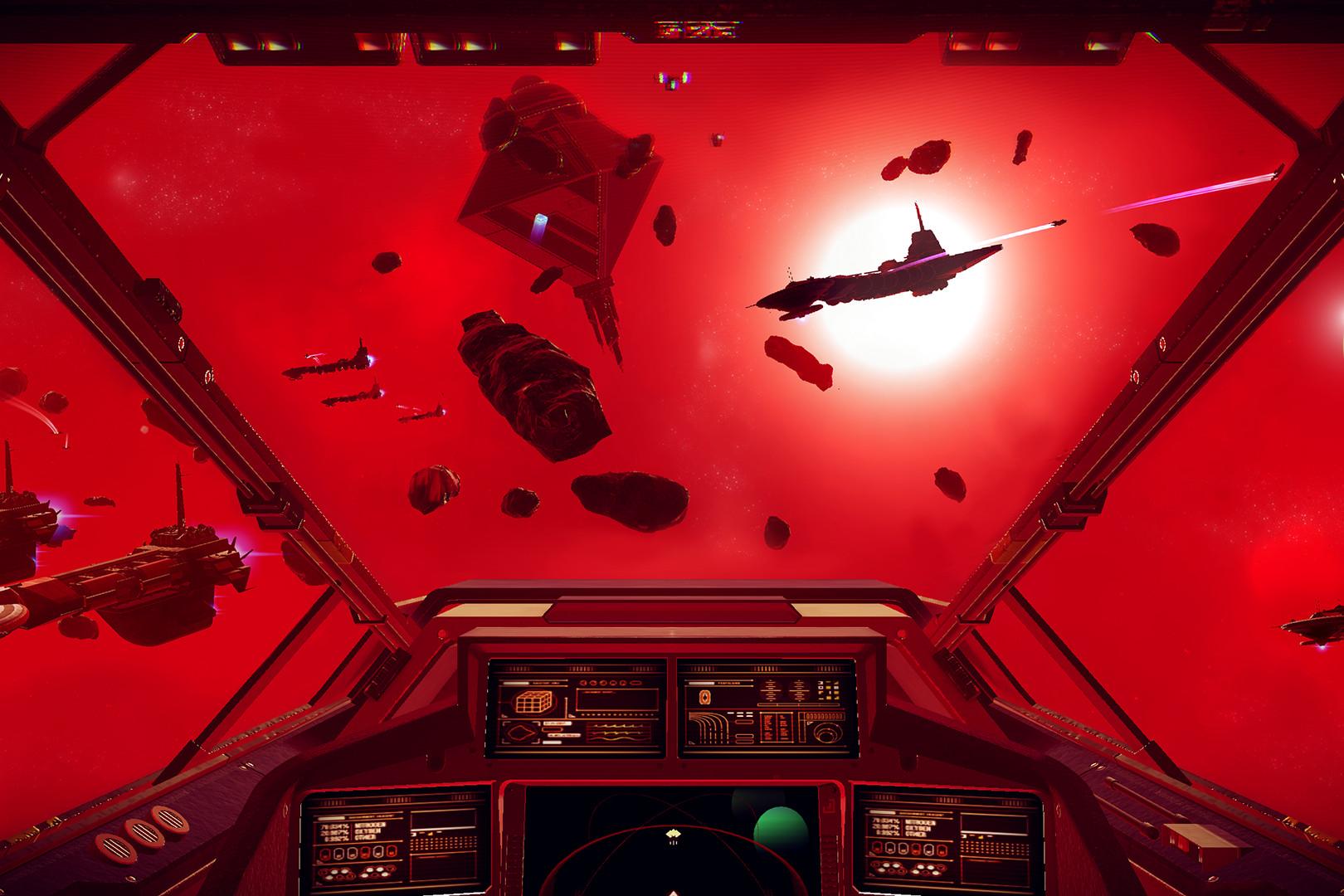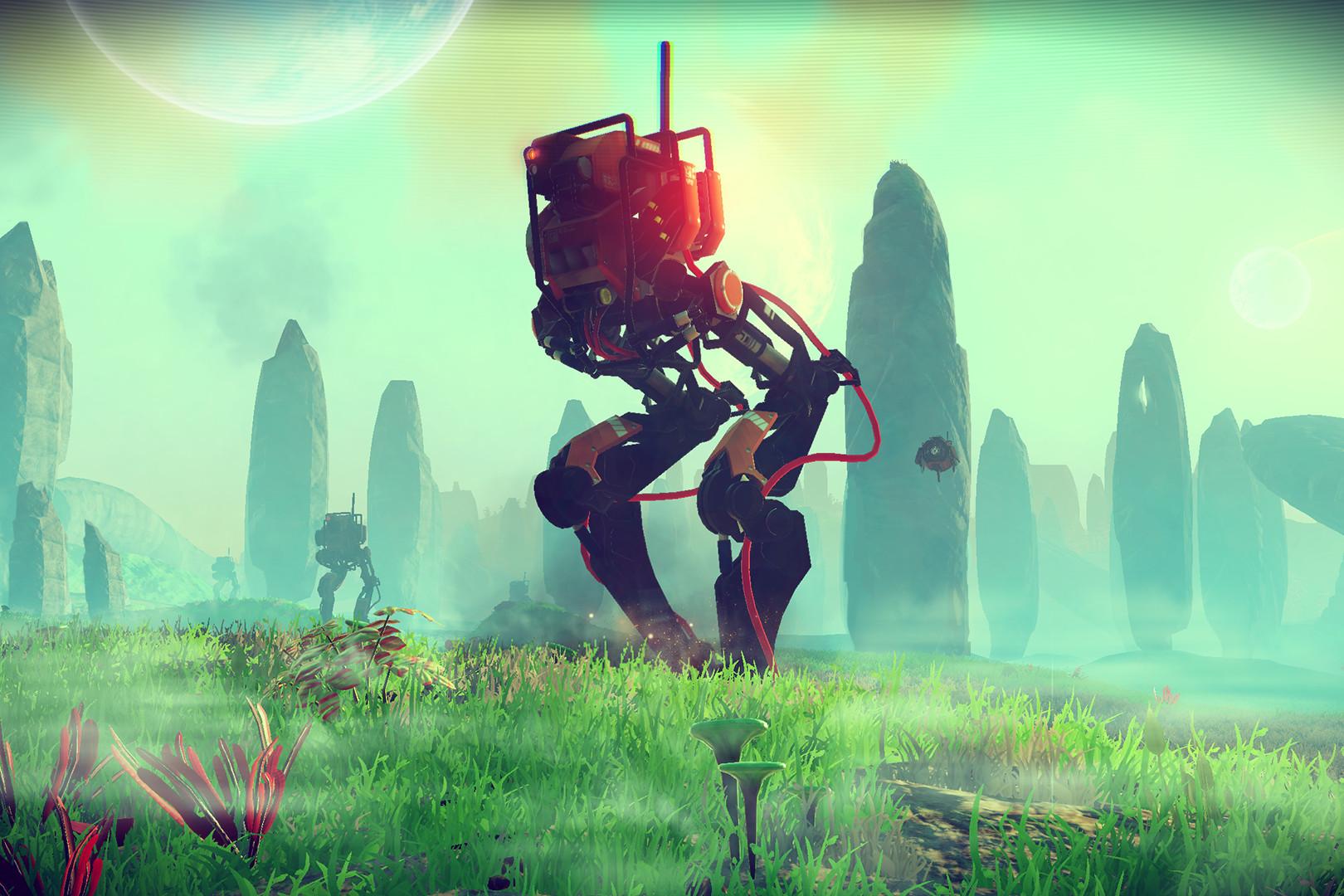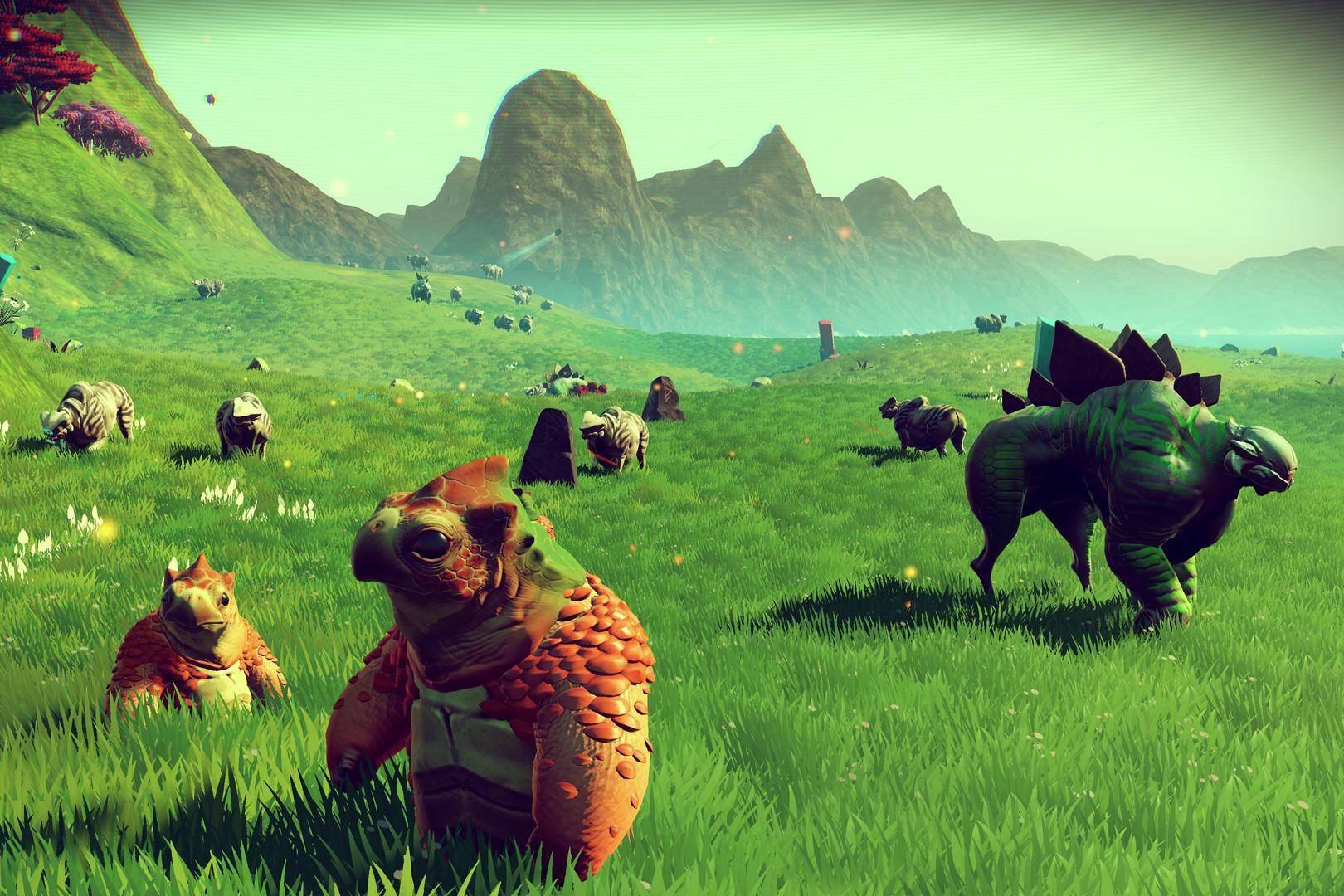In my first week with No Man’s Sky, the hugely hyped, genre-blending, barrier-busting game that debuted on PlayStation 4 on Tuesday and appears on PC on Friday, I remembered Red Dragon — not the one with Ed Norton, but the 17th-century ship. We know about Red Dragon because its captain, William Keeling, kept a diary, a scrap of which survives. On September 5, 1607, Keeling recorded that his crew had staged an onboard production of Hamlet, which marks the first known amateur performance of a Shakespeare play. This was the tail end of the Age of Exploration, when a crew could, on any given day, die or discover new land while going about its business; two years later, Keeling became the first European to see the Cocos (Keeling) Islands, and 12 years later, the Red Dragon was attacked and destroyed by the Dutch. It sounds exciting, and sometimes it was. Mostly, though, it was monotonous. Keeling and other captains put on plays not because they believed in arts education, but because it helped dispel the “sheer boredom” of daily life, which bred “inefficiency, disaffection, and even outright mutiny.” In a world without horizons, the trailblazers craved a convention that gamers know well: the scripted event.
No Man’s Sky tries to toss out the script and subsist on a steady diet of novelty. There’s no perfect time to pass judgment on how well it succeeds. “I’ve seen journalists say, ‘Here’s my interim review, and we’ll write a full review once I’ve gotten to the center of the universe,’ or ‘I’ll write a full review once I’ve completed the game,’” says Sean Murray, cofounder of No Man’s Sky developer Hello Games. “I’ll be very interested to see if they will ever write that review, because it’s a big game.” After dozens of hours, I’m not appreciably closer to that ostensible goal (getting to the galactic center) or to finding out more about the mysterious “Atlas” (a celestial, omniscient orb that oversees existence, like Destiny’s Traveler) than I was when I started. In that sense, I’ve seen almost none of what the game contains. In another sense, I suspect I’ve seen everything.
No Man’s Sky offers four core activities that would have felt familiar to Keeling and his contemporaries: explore, trade, fight, and survive. All of these activities transpire in a setting that starts with Shakespeare’s premise — All the world’s a stage — and then strips out its apostrophe. The universe of No Man’s Sky is so enormous that not only will no one player come close to seeing its entirety, but a combined armada of millions of players (who’ll only occasionally cross paths, like individual grains in an almost infinite sandbox) won’t either. That absence of boundaries creates its own questions: Maybe a lack of limits is itself a limitation, and maybe the ability to go everywhere makes people less inclined to leave home.

No Man’s Sky seized the internet’s attention at VGX in 2013, when Murray shared a short gameplay video. “At the time we thought of it as a pretty niche game,” Murray says. “It was 60 seconds of me walking along a beach and flying into space. We could never have predicted that that could be so popular.” The buzz snowballed in a series of high-profile showcases: another show-stealing performance, at E3 in 2014, a 6,000-plus-word New Yorker profile when the game was still more than a year away from release, a late-night demo for Stephen Colbert. By this spring, anticipation had swollen to the point that news of a short delay led to death threats, not only for the writer who reported the postponement, but also for Murray (whose death, I’d imagine, would only have led to a longer delay).
It’s telling that one virtual takeoff was all it took for the game to take off in real life. On The Late Show With Stephen Colbert, two years after that VGX video, Murray expressed his mission statement: “What we’re trying to do is make an entire universe, generated by the computer, and then we’re gonna set people loose in it.” Every game constructs its own universe, but most of those universes, restricted by labor and budgets, are small, narrowed by shrubs or containers a character can’t climb over, invisible borders and skyboxes that force the player to proceed along a set path, or loading times that clumsily mask transitions between environments. No Man’s Sky operates on a superhuman scale by taking the world-building out of human hands, using a set of programmed parameters to procedurally generate a universe down to the visual template, atmospheric conditions, and flora and fauna of each of its 18 quintillion worlds. (It’s not a No Man’s Sky post unless it says “18 quintillion” somewhere.) Light on specifics, the first No Man’s Sky snippets we saw spoke to everyone who’d ever been teased by a game whose concept promised unlimited possibilities (my weakness was Escape Velocity) but whose execution or graphical fidelity couldn’t quite match the ideal we had in our heads.
The trailers didn’t distort the engine’s empowering permissiveness. No Man’s Sky really lets you go anywhere, rocketing seamlessly from surface to space. Its size is astonishing: The first time you realize that it would take hours (if not days) to reach a distant destination at the default walking or cruising speed is a mind-blowing moment. In its early hours, when the game is tightly focused on specific tasks — repair and improve a damaged ship, and use it to escape the first solar system — it inspires all the emotions Murray hoped to provoke. There’s the thrill of being the first, and quite likely the only, person to set foot on distant soil, coupled with an oppressive sense of being a miniscule part of the picture — the same half-life-affirming, half-insignificant feeling one might experience while staring at a starry night sky or studying a scale model of our solar system.

“I’m actually really happy when people say to me, ‘I was playing your game and I felt really overwhelmed by it,’” Murray says. “I like that because that’s cool, you’ve never had that in a video game before. That’s really interesting, if nothing else.”
The specter of “nothing else” surfaces after a few solar systems. The fleeting awe Murray mentions is probably worth the price of admission, but it’s not enough to convince most players to spend an appreciable portion of their pitifully short, non-No Man’s Sky–scale lifespans exploring an only partially explorable space. And in transcending the medium’s traditional handicaps, No Man’s Sky encounters a whole host of its own.
After the early hand-holding, the game largely leaves you to entertain yourself, like a cosmic latchkey kid. Much of the entertainment revolves around collecting the natural resources that fuel your life-support systems and power an RPG-style upgrade system. Like the slight darkening at the upper corners of the screen, which subtly suggests a helmet protecting your unglimpsable avatar, the need to tend to your suit makes you feel like a stranger in a strange land without intruding enough to turn survival into a chore.
But with grinding as its centerpiece, No Man’s Sky suffers from some of the same mundane drudgery that made Red Dragon’s sailors so bored out of their skulls that they reached for poor Yorick’s. The predictable downside of procedural generation is that the game skimps on some of the finer points. Combat, both on and off the ground, is rudimentary. Interactions with non-player characters are formulaic and confined to text. The environments, so striking and varied from afar, reveal their seams and sameness upon closer inspection. On PS4, at least, the game is prone to occasional crashes and glitches; not enough to sabotage the experience, but enough to remind the player that technical ambition often comes at a cost. And although No Man’s Sky is teeming with virtual life, making most discoveries feels like leaving a “First!” at the top of a comment thread: You may have been there before anyone else, but no one knows or cares. Moreover, you can’t catch ’em all, which works against the completionist impulse that keeps people coming back to finite titles.
Death in No Man’s Sky is both easily avoided and fairly free of consequence. And because an “end” to the game seems almost unattainable, the goals get small: a stronger shield, a ship with more storage space, a multi-tool that mines minerals more quickly. The real enemy isn’t the elements, but the inventory, which artificially limits how much you can carry and forces you to look away from the landscapes (and spacescapes) to flip through menus in search of empty slots.

In light of those realities, it’s easy to settle on a sequence that makes the near-miraculous routine. Jump to a solar system; scan it for objects of interest; plant your flag on a planet or moon; visit a few save points located at interchangeable, generically labeled installations (“trading post,” “transmission tower,” “abandoned building”); visit a cookie-cutter space station to offload your loot. This is fun the first few times. Paradoxically, though, the more ground you cover, the smaller the game’s scope starts to seem. The “journey milestones” that sporadically flash on the screen, celebrating some number of steps walked, solar systems seen, or words in alien languages learned, feel less like achievements than testaments to the player’s endurance.
No Man’s Sky was destined to disappoint some stans who had their hopes up, but even though Murray’s power to generate real estate outshines the content he manufactured to fill it, the game didn’t disappoint me. It was always too much to expect that one game made by a small indie studio could capture creation on such a massive scale and still perfect the small stuff. What’s more, any week-one look at No Man’s Sky comes with the caveat that there are other worlds than these; the game might still have some surprises in store. And even if there’s no more than meets the eye now, there might be more next month or next year. (The existing story, such as it is, seems to have been a late addition in the game’s sweeping prerelease update, which promised more enhancements to come.) No Man’s Sky could evolve the way Destiny did, via patches and expansions, from a letdown on day one to a more fully featured product. “We finished the game and we put it on a disc, and then we did an update and that was finished, and next month we’ll probably do another update and that will be finished,” Murray says. “In a weird way the game is always finished but it’s always never finished.”
For now, No Man’s Sky is a test of your tastes, a sprawling slate that forces you to decide whether you want a curated, quality-checked experience in which every moment is mapped out, or an open-ended adventure in which moments of wonder compete with the type of rote tasks that many people play games to avoid. With or without you, the game’s weird-looking life will go on.
